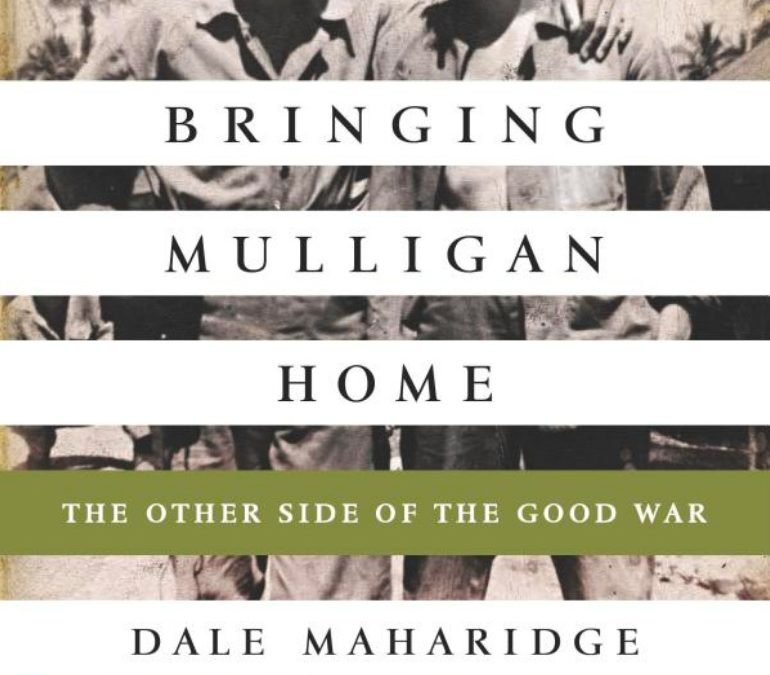Reading List/Reviews
BOOK REVIEW: ‘Bringing Mulligan Home’:
For Veterans a Route-Map; For Their Families a Reasoning
Saturday, March 16, 2013 – 20:09
Huntington News Network
Reviewed by Gary R. Prisk![]()
Recreating a Marine Company’s past, searching for answers, the son of a combat veteran attempts to recover one of his father’s comrades. ‘Bringing Mulligan Home’ (Public Affairs, 318 pages, $26.99) is a well-crafted father-son quest: What happened to Herman Walter Mulligan, the dead Marine who haunted the life of Sergeant Steve Maharidge?
Sergeant Steve Maharidge did not kill Herman Walter Mulligan. “I did not kill him,” he screamed at a picture mounted above a grinding wheel in his basement redoubt, his post-war foxhole. And yet the guilt played on—they said he killed Mulligan. He could have done something, given more specific orders. Such is the judgment awarded combat infantry fire-team leaders, squad leaders, platoon leaders, et al — a judgment with recurring nightmares.
Dale Maharidge’s ‘Bringing Mulligan Home’ is a wonderful story. The author brings to the art of non-fiction the rhythm and suspense of a tall tale. And yet the author was able to describe the brutality of infantry combat with graphic disgusts: the desecration of the dead; the collection of souvenirs including gold teeth and ears; the slaughter of the wounded including women and children, and; the orders both spoken and implied totake no prisoners—as it was in Vietnam when an infantry unit had limited support.
The author has written a book that should be required reading for those grappling with the crippling effects of Post-Traumatic Stress Disorder (PTSD). His father was haunted by the carnage he helped create, by having lived, and more specifically the notion that he caused the death of Herman Mulligan. Did he have a disorder? Sergeant Steve Maharidge had definitely changed. My God, he was screaming at a picture.
And so, Sergeant Maharidge sought the constant drone of grinding steel in the security of his foxhole, his basement. Here he could talk to his comrades, deny he caused Mulligan’s death, and scream at a picture of Mulligan, taken in 1944 on Guadalcanal. He could scream at the picture any time he needed to get the man’s attention. You see, in Sergeant Maharidge’s mind, he did not have a disorder, (PTSD). He was perfectly normal for what he had been through.
The man Sergeant Steve Maharidge saw in the mirror was Post-Combat Normal, and no matter who found him annoying, he was not going to be Civilian Normal again.
If only he could have served under General Douglas MacArthur he might be Civilian Normal now. That General may have been a pompous ass, but his tactics of bypassing Japanese held islands saved tens of thousands of American lives, and the slaughter of many more civilians.
But Sergeant, grand victories require massive casualties.
To be crudely enlisted in Chester Nimitz’s ‘Corkscrew and Blowtorch’ school of tactics was a tragedy for the Marines of Love Company, 3rd Battalion, 22nd Marines—for every Marine fighting in the island-hopping Pacific Theater during World War II. Bypassing Iwo Jima and Okinawa would have saved tens of thousands of American lives. The author is far too kind to Chesty.
Sergeant Steve Maharidge would agree. So would Herman Mulligan, and Kennedy and the other Marines the author interviewed to recreate the battles and engagements, and the route-of-march of Love Company. And yet the slaughter went on, island after island.
For Nimitz a Marine was a number on a combat unit’s morning report, a plastic soldier. Mulligan was present for duty as an ‘Effective’ before he died. After being buried in an explosion and presumed dead, his body was paper-transferred out of Love Company and assigned to the 3rd Battalion’s supply channels—just Mulligan, a case of grenades, and a case of K-rations—same shelf, second and third bins. That Mulligan’s remains were missing only added intrigue to the grand victory.
Detailing the firefights with his father’s comrades, nudging them gently toward the goal of finding Herman Walter Mulligan, the author brings the reader to the island of Okinawa, to the battle for Sugar Loaf Hill, and to the turtle-back tomb where Mulligan died. As I sit here today, I would like to find Mulligan—and the rest of our MIA’s.
Masterfully written, amid the grizzly accounts of shooting the wounded, rape, and the shooting of wounded babies, the author is able to keep the reader focused, as one interview leads to another until the reader tries to help find Mulligan, and hopes Dale Maharidge finds his father’s nemesis.
A note from my father: Taken from Omaha Beach, June 1944: “One must never break faith with those who died.” Major Edward Prisk, US Army Infantry. My father’s one regret—the thousands of dead animals.
A note from the reviewer, a blooded grunt: Sergeant Steve Maharidge continued to bury himself in the drone of grinding steel, hollering at a picture of him and Mulligan taken on Guadalcanal in 1944. Sergeant Maharidge knew, as do all blooded infantry veterans, that loud, continuous noise allow our minds to travel back in time. The recall can be vivid. And, if left alone, we can temporarily sort out our demons. We might even holler at a picture. It is best not to interrupt the process.
Here is a tribute to the author, Dale Maharidge. Thank you for your effort to find Herman Walter Mulligan, one of America’s treasures. As an infantry veteran of Vietnam’s war I was honored to review your work. The story has helped me sort out the brutality of my war, and has put the atrocities I witnessed in perspective.
‘Bringing Mulligan Home’ should be in every high school history classroom in America. I will read it again—5 stars. I recommend ‘Bringing Mulligan Home’ to every infantryman still standing… or rolling.
About the reviewer
Gary R. Prisk is a best-selling author and an infantry veteran of Vietnam’s war and the first Gulf War. He began his army service as a Special Forces medic with First Group, attended parachute school at Fort Benning in 1964, received a regular army commission through ROTC at the University of Washington in 1966, fought in Vietnam’s war with the fabled 2nd Battalion of the 503rd Infantry, 173rd Airborne Brigade in 1967 & 68, and became an army Ranger in 1969. Joining army reserves in the Seattle, Washington area Prisk returned to the University of Washington earning degrees in Mechanical and Industrial Engineering, an MBA in Finance, and taught Finance at the university as part of his doctoral studies in finance. Prisk continued his service in the army reserves for 29+ years ending his career as the reserve-component Chief of the Battle Coordination Center for VII Army Corps, headquartered in Stuttgart, Germany. After retiring from the construction industry Prisk began writing and lectures on Vietnam’s war.


Recent Comments